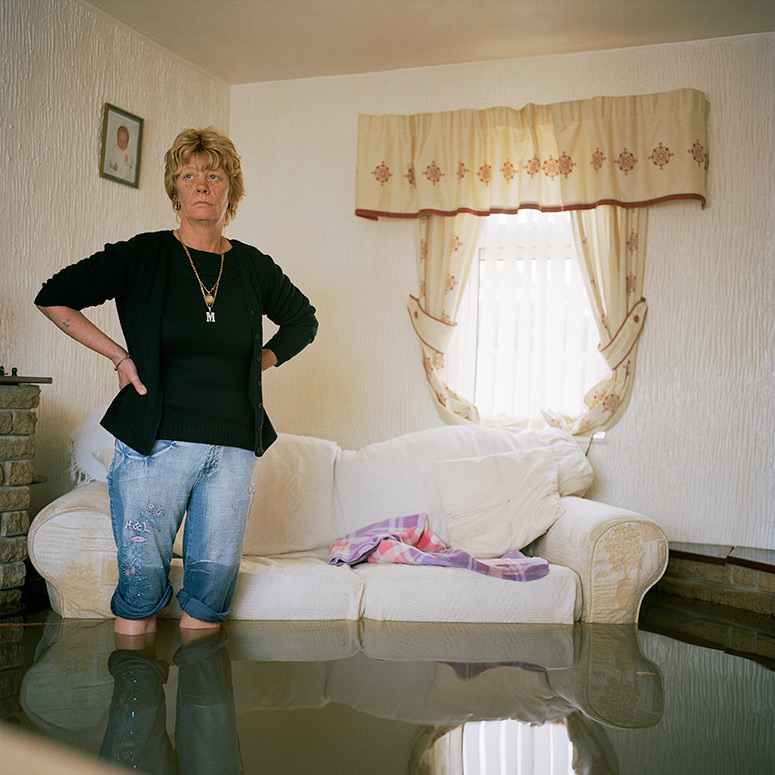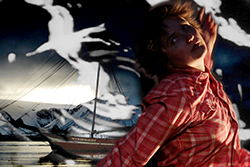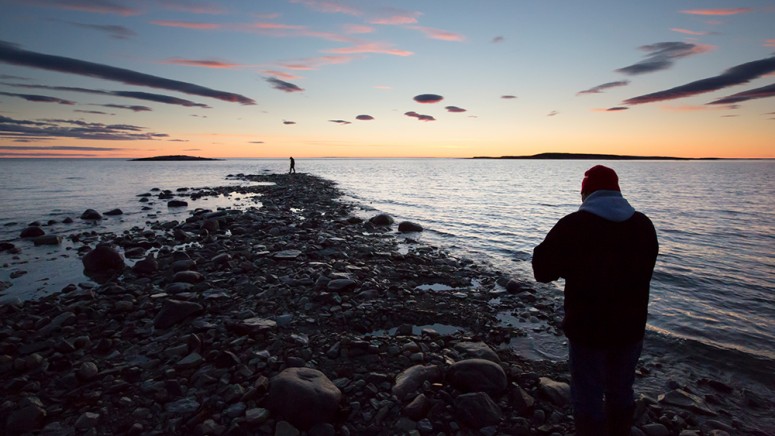Adria Vasil: Carbon 14’s Electric Idea + Longer Q&A with Claire Sykes
by Adria Vasil
Tucked into the second floor of the Royal Ontario Museum, above the lobby’s dinosaur bones, lies an electric idea. The giant quote on the museum-white walls reads: “Global warming is really a social and economic problem. It is also the greatest opportunity for creativity and innovation we have ever had.”
Hell, yeah.
Welcome to Carbon 14: Climate Is Culture, a multi-model, city-wide exhibit and four-month-long festival spawned by Cape Farewell, a foundation dedicated to sparking an artistic and cultural response to climate change.
Two years back, the UK-based foundation gathered 25 artists from Canada, the U.S. and Mexico to grill a bunch of climate “informers” – scientists, politicians, economists, technologists – and then dream up works of art to connect and inspire in ways that a briefing paper on climate change just, well, can’t.
A few feet into the exhibit, I’m already stopped in my tracks, daydreaming about the enormous creative opening represented by the crisis. As the Buddhists always say, deep suffering is humanity’s big pathway to enlightenment. Maybe these artists can help us with a shortcut.
Just don’t expect any oil paintings of lonely polar bears. At least not here. In #crazyweather, Sharon Switzer’s gathered real-world tweets. Having tweeted about the topic myself, I find the words flashing in the ambient video oddly familiar and initially banal, but on a 10-minute loop they are definitely unsettling.
Eerie sonic pulses pull me toward a film installation by Minerva Cuevas on severely threatened coral reefs. The video footage of some scuba divers holding a banner that reads “In trouble” isn’t itself all that powerful, but layered with the disquieting audio bubbling into my brain, the piece about the Mesoamerican barrier reef is making my eyes well up. This is what artists can do that policy wonks can’t.
The exhibit, just one component of the festival that runs through February, invites you to watch and listen to Inuit elders, Baffin Island hunters and Atlantic storm sufferers – all living embodiments of the fact that climate is culture.
Just when my nervous system can’t take any more sonic blooping and beehive humming (from Myfanwy MacLeod and Janna Levitt’s Beekeeping For All installation), we’re offered a paradigm shift, one that asks us to unleash our humanity in the form of ingenuity, innovation and cooperation. Okay, but how?
As the overhead speakers announce that the ROM’s about to close, I walk into the final room, The Potential Project, a collaboration between artist Mel Chin and people of the Western Sahara on developing a currency and an economy “backed not by gold or gas, but by the sun.” Yes. This is the whole point of Carbon 14. Dig in, jam and get inspired by our solutions. Oh, and do it quick, because the clock’s about to run out.
As the waves of sound and security guards usher me out, I take one last look at the quote hanging on the entrance wall – and in the air – before I go: “We can all be part of the solution,” it proclaims. “Rather than fearing change, we must embrace it.”

Gideon Mendel, Margaret Clegg, Toll Bar Village near Doncaster, UK, (from the series Drowning World), 2007
AV: What does culture have to do with climate change?
In a word, everything. That may seem a bit glib, but I really mean it.
I’m talking about culture in two senses. The first is about the work of culture. We need the cultural and creative sector to tell the story differently—in ways that science, and the hard often-dry facts, cannot—and to envision the solutions; to imagine, design, and communicate what a resilient and exciting future might look like. To inspire change.
Cape Farewell’s mandate is to provide opportunities and venues for a cultural response to the issue of climate change through a rich program of expeditions, residencies, research, public art projects, books, films, performances, and exhibitions. And now a four-month festival!
The second notion of culture stressed here is that the problem of climate change is deeply bound-up in the way we choose to live our lives. Climate change is essentially a cultural problem not an environmental problem.
AV: When you say climate change is essentially a cultural problem not an environmental problem, what do you mean by that?
The scientific evidence unequivocally tells us that the global climate system is changing at an unprecedented rate and in increasingly destructive, self-accelerating ways—so, sure, climate change presents as an environmental problem—but there is also growing consensus among scientists that human activity is the primary cause, and certainly the accelerant. It is us, and our dependence upon fossil fuels that is causing climate change.
We held our Carbon 14 workshop two years ago in Toronto, and one of the invited participants was the internationally renowned climate scientist Dr. Andrew Weaver. In his talk, after explaining the science, he reminded us that it is not science that is going to provide an answer to what in fact are the social, political, economic, and importantly ethical questions raised by the climate crisis. We spent the rest of the weekend diving into these complicated questions.
And this point is exactly what remained with me; that climate change is a problem that needs to be tackled at the level of culture—how we choose to live, and what we choose to do. The bright side of this realization is that we can do something if we collectively choose to.
AV: You say meaningful change must happen first at the level of culture. How do we do that?
First of all we need to stop treating this as a debate. The questions are no longer whether climate change is real, but rather how we are going to deal with it. We have to realize that doing nothing is not an option.
Mitigating climate change, like it or not, will require us to change our behaviors and patterns of consumption, to reduce our dependence on fossil fuels. Doing so will require technological innovation. But it will also require economic incentives (a price on carbon emissions), sacrifices, policy changes, and importantly the political will.
We need to embrace change and unleash the power of our creativity, ingenuity, innovation, and ability to share knowledge and cooperate—in short, demonstrate our humanity.
A cultural response to the issue of climate change seeks to engage our best creative minds to help us make sense of the problem, to address the causes, to challenge and provoke us to think and feel differently about our behaviour and to inspire and inform change. Art can do this. It can connect us and inspire us. What excites and inspires me so much about the Cape Farewell project is that it values creativity and sees the solutions as residing in the very fact that we have culture.
AV: It’s not often that climate scientists get to work with artists. How does the union elevate the message?
It’s certainly not about telling artists what to do, say or think. It’s about providing an opportunity to respond to what it is that inspires them when they consider the issue. You get the best work that way, a genuine response I think.
Cape Farewell seeks to bring artists and scientists together in order to communicate the problem differently—recognizing the value of interdisciplinary work and sharing. The scientific facts alone can be pretty bewildering without narratives and expressions to connect it to our lives and our communities, to our fears and aspirations.
For many the problem remains abstract and is not experienced as immediate (although this is changing fast), and once you do recognize the problem the solutions can seem unobtainable, certainly on the time scale needed.
For our Carbon 14 workshop it was important for us to hear from informers from the broader professional spectrum of climate change engagement, to include economists, social scientists, new energy technologists, in addition to climate scientists—and to extend that discussion to consider this dimension.
AV: How important was it to branch out of the museum and also put Carbon 14 on the street in and other venues?
In general it is important for us to find suitable and effective platforms and venues for the work the artists are doing. In many cases this is outside the museum or gallery context—it is ultimately about how best to communicate their work and ideas.
While our exhibition at the ROM is at the centre of what we are doing for Carbon 14: Climate is Culture, the larger festival encompasses a range of activities with our partners including theatre, performance, music, film, poetry, talks, and public screen based work. Again, the notion of culture here is broad and inclusive and the aim is to engage as wide an audience as possible.
Our programming partnership with Pattison Onestop however has been a really important one from start, simply because it is an incredible means of bringing work to a very large and diverse public. With Pattison we have five screen-based art projects as part of our festival, which I curated with Sharon Switzer, their arts programmer. For instance, we presented an installation on the Subway Platform Screens across Toronto (TTC) of Colonel Chris Hadfield’s beautiful and at times awe-inspiring images from space—this project, entitled “A Rare Perspective” — had an audience of millions. Likewise our presentation of British-based photographer Gideon Mendel’s incredibly powerful “Drowning World” project went nation-wide on the Pattison network of shopping centre screens. I think the effect of this work is amplified by the context and by our habitual association of such screen messaging with calls for consumption. In this case people going about their everyday shopping activities are confronted by Mendel’s portraits of people standing amid devastating flooding, mostly in their own domestic or everyday environment. The images, taken in eight different countries recently hit by massive floods, bear witness to a shared experience that erases geographical and cultural divides, and resonate with our own recent Canadian experience of increased flooding (Toronto, Fredericton, and Calgary).
AV: You put the real David Suzuki on trial for libel for calling for an end to oil. Truth and fiction are awfully close in this piece.
The Trial of David Suzuki was, in my opinion, a bold and smart piece of theatre. Dr. Suzuki played himself and defended his Carbon Manifesto, a genuine document that calls for the end of oil within a generation. The trial setting, along with the legal charge of seditious libel—all possible, but indeed fictional—created a context in which both sides were able to make a reasoned case for the economic consequences for Canada, if we actually decided to get off oil within a generation. As Laurie Brown, the creator of this project, explained it to me, she had become frustrated by the constant shutting down of any conversation about solutions, or the sidetracking of such conversation by quibbles over the degree of temperature rise, or calls of hypocrite (the oft heard “how can you talk about solutions when you drive a car” etc.). She wanted to use the solemnity of the courtroom to create as close to an impartial space as possible, for the respective cases to be made and considered, and for us to at least “stay on topic” for a couple hours. Knowing we are all complicit, she cleverly wanted to place the duty upon us—the ultimate jury—to listen, decide, and act.
It was a remarkable event and a great example for me of the power of creativity.
AV: Having curated Carbon 14 what are you taking away from the experience and what do you hope Toronto takes away from it?
Well for me the best of part of this job has been getting an opportunity to work with some really incredible artists, and feel like the work we are doing is worthwhile.
But one of the most empowering things that I am taking away from this project is an appreciation of the importance of teamwork. And I mean that in a pretty profound way—practically, on the level of collectively producing a project like this, but also on the level of the issue at hand—the problem of climate change and how we are going to deal with it. It is a realization that underlines the truism that things do not happen on their own, nor through the actions of isolated individuals. The kind of change we need requires shared understanding and shared effort on a huge scale. It will require global teamwork.
Cape Farewell demonstrates this time and again—it is fundamentally about partnerships and collaborations, bringing different skill sets together to collectively realize great things. The remarkable cross-discipline and cross-cultural cooperation and co-creation that make this project work are powerful examples of what is possible, and of what it is needed.
Art has the ability to express abstract ideas in powerful concrete ways. My hope is that Carbon 14: Climate is Culture resonates with people in Toronto, and beyond, and that Cape Farewell is seen to contribute a positive and dynamic new voice to this urgent public conversation.
See Published Article…
NOW Magazine’s Echoholic columnist Adria Vasil’s recent article Carbon 14’s electric idea, includes her text above and an edited version of this interview. See the November 28-December 5, 2013 issue of NOW Magazine (VOL 33 NO 13).











